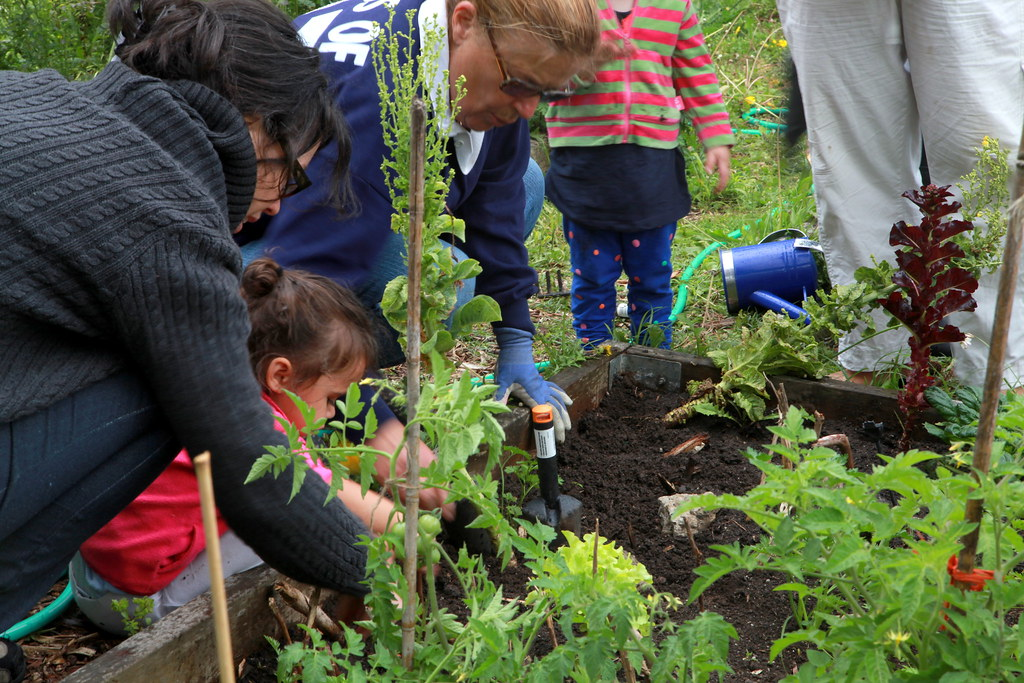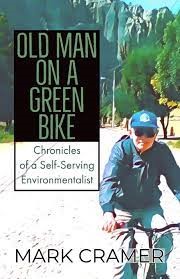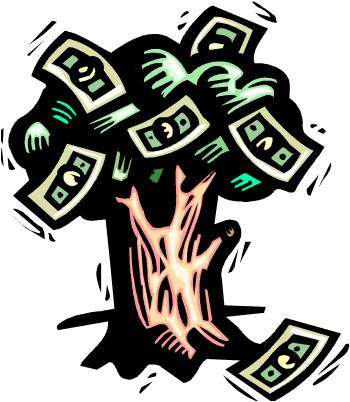War of the Words: Rebranding the “Healthy Economy”
by Mark Cramer
Industries strive incessantly to increase human productivity, often by way of mechanizing or automating tasks. After all, there are limits to purely human energy, strength, and ability. Without more workers, we require technological innovation to overcome these limitations. Fortunately for the pro-growth industries, technology doesn’t earn wages.
Even outside of the workplace, technology takes the place of utilitarian exercise. Long ago, most people hunted and gathered their own food. Later they walked to markets. Nowadays, those of us who don’t drive ourselves to supermarkets can have our pre-packaged groceries delivered to the doorstep.
Our ever-growing, production-driven economy has converted us into sedentary beings. Studies have shown that as countries become wealthier, Body Mass Index (BMI) for the bottom 80 percent of the population worsens while BMI for the richest 20 percent improves. Degrowing to a steady state, then, is likely to yield significant health benefits for (at least) 80 percent of the population.
Reclaiming the “Healthy Economy”
Part of the path to improving people’s health (and arriving at a steady state economy) includes reclaiming the health-related vocabulary pro-growth economists have monopolized. Adjectives like “healthy” and “robust,” nouns like “recovery,” and verbs like “strengthen” have been reappropriated from the realm of human health for an (ironically) unhealthy economic system. A “robust recovery” in the soft drink industry means an increase in cases of type two diabetes, and the health care industry is “strengthened” when more people are sick.

An economy designed for perpetual GDP growth is best described as “sickly.”
We might be better equipped to spread the message that taking a brisk walk outdoors is preferable to driving to a fitness club if we first stop describing the growing economy as healthy. If we can’t reclaim the health-related terminology from economic discourse entirely, the least we can do is call a spade a spade; that is, describe a growing economy as “sickly” and replace terms like “green growth” with “brown bloating.”
To introduce viable alternatives, we need to recapture the language, especially as it relates to utilitarian use of metabolic energy. Otherwise, we can win the battle of logic but still be defeated in the war of words. Reappropriating positive health-related vocabulary for degrowth and steady-state alternatives is a great place to start.
Public transportation seems like enemy number one for GDP strategists, if opinion writers for the Heritage Foundation and the libertarian Cato Institute are the gauge. Yet “active transit” would be an apt phrase for public transportation, with a clear link to public health. When one uses light rail or a bus, it’s necessary to walk to and from the bus stop or rail station on both ends of the commute. It’s fine exercise; as good as any treadmill, and far more stimulating.
In Paris I usually commute by bicycle but using the metro has helped me avoid rush-hour traffic. The brisk walks to and from the metro add 40 minutes of utilitarian exercise, roughly equivalent to the exercise benefit of 50 minutes of biking (the amount it takes for a round trip).
It’s common sense that active transit is healthier than passive. Common sense is corroborated by statistical case studies, too. One such study showed that a mere “one percent increase in county population use of public transit is associated with a 0.221 percent decrease in county population obesity prevalence.”
Degrowing Our GDP and G-U-Ts
Replacing fossil-fueled machinery with human metabolic energy is a simple step towards degrowing some of the most detrimental industries. The automobile industry, for example, is responsible for approximately 4.5 percent of all jobs in the USA according to pro-car researchers. During a policy debate on public transportation at the Paris Hotel de Ville (City Hall), I witnessed car company lobbyists warning that if the municipality curtailed car use, the economy would suffer. (When called out on fossil fuels, they flashed their trump card: the electric car.)

Trading fossil power for human power is a step towards a truly healthy economy. (CC BY 2.0, Kristoffer Trolle)
In other words, these lobbyists believe (or would have us believe) we should rejoice at the opportunity to sit immobilized behind the wheel during a traffic jam because we are “lifting” GDP. Yes, in GDP parlance, we can now lift while remaining inactive.
The CDC has attempted to counteract such lobbyists by explaining what would happen if we kept our cars parked for trips under a mile. The answer is startling. Car trips under a mile equate to 10 billion miles per year in the USA. If Americans traveled half of these trips on foot, the result would be the equivalent of taking 400,000 cars off the road each year. The “health” of the automotive and oil industries would diminish as the health of the American people improves, all while saving drivers $900 billion.
A study cited by the CDC found that eliminating car trips under five miles (round-trip) in urban Illinois, Indiana, Michigan, Minnesota, Ohio, and Wisconsin would result in nearly $5 billion in health benefits from improved air quality. The same study estimated that if half of these car trips were bike trips, $4 billion in healthcare costs could be saved—along with well over a thousand lives.
Another segment of the economy that contributes heavily to GDP with malignant results for our personal health is the food industry, from farming to food services. “Agriculture, food, and related industries contributed $1.055 trillion to the U.S. gross domestic product (GDP) in 2020, a 5.0-percent share.” The industries also “contributed” to a “healthy” dose of obesity.

What could be better than walking to the grocery store? Participating in a community garden! (CC BY 2.0, d-olwen-dee)
With a healthy dose of human energy, we can grow our own food while staying trim. Local gardening can reduce the role of fossil fuels in food distribution, too. The average tomato travels more than 1,300 miles from farm to supermarket. We can do better than that. Plus, the result for public health would be significant beyond obesity concerns: fresher, nutritious food; revitalized bodies; and fewer trips to the doctor. The more families that do their own gardening and composting, the bigger the hit taken by the food industry and GDP—and the better our health.
Like walking and cycling, gardening isn’t just healthy, it’s satisfying and enfranchising. Many cities have nonprofit organizations that help homeowners convert their lawns into gardens. Even apartment dwellers can participate in community gardens sprouting up in smart American cities and common around the world. These vibrant spaces combine active living with social connectivity.
Who would have thought that the very language of health would be siphoned away from human beings and applied to GDP? Who would have thought that we’d reach a point in history where walking, bicycling, and gardening would become acts of rebellion? I am not an economist, but I suspect that when we use our own metabolic energy in utilitarian tasks, the vast majority of us will be healthier and happier while GDP declines.
 Mark Cramer is the author of Old Man on a Green Bike: Chronicles of a Self-Serving Environmentalist.
Mark Cramer is the author of Old Man on a Green Bike: Chronicles of a Self-Serving Environmentalist.








There is another important “War of Words” case in the climate policy debate.
Economists usually describe the climate policy problem as “by reducing carbon emissions present generations pledge offers for the well-being of future generations”. Implicitly such formulation assigns the property rights on the atmosphere and the climate to the ‘present generations’, in particular to the wealthy part of it, most to the 1% obscene rich.
Rebranding by proper framing and language reorders the legal positions: ‘Carbon dioxide emitting is gaseous littering of the atmosphere’.
Littering is illegal: the duty of the litterer is to stop littering immediately, and to clean or at least compensate the mess s/he made.
Thanks Aviel! How could I have missed this one! Yes, indeed, “littering” is the word we should use. Now we need to come up with a word for the obscene 1%. Not quite happy with my first attempt: the “ill litterates”. I tried the Litterati, but turns out an app with that name is supposed to stop littering.
That “obscene 1%…” I called it the “liquidating class” in Shoveling Fuel for a Runaway Train, as the liquidators are accountable for the liquidation of natural capital at a vastly inordinate level. The lower 80% was the “steady state class” and the in-between 19% was the “amorphic class,” variable and swinging in either direction, depending upon social/cultural pressure.
Shoveling Fuel was off to a nice start but got chopped off at the knees by 9/11, for reasons that are evident enough. So much for the “steady state revolution” of 2001.
How about bringing back “Shoveling Fuel for a Runaway Train” as an animated film with the title, The Liquidating Class.
KUDOS, Mark. I’ve long contended that the private & public Powers-That-Be use language in an Orwellian manner in order to mold the public mind. It doesn’t matter much whether such use is on purpose or inadvertent. The result is that about 90% of us are misled and propagandized by movers & shakers who are stunningly ignorant of biophysical processes and the laws (and value) of Nature.
Nevertheless, they do appear to be most adept at greenwashing when it comes to the ongoing socio-eco-econ-ethical Crisis in which we find ourselves. The spirit of Edward Bernays still pervades the society of Establishment elites.
http://individualsovereignty.blogspot.com/2022/06/a-clear-and-present-danger-to-american.html
Thanks for the good word, Scott. Your reference to Bernays and to the “cult” thinking you refer to in your linked article causes me to take some time out to look at other areas of life/culture to see where I myself may still be manipulated by language. You point me to another nuance; the “inadvertant” use of manipulative language may be even more difficult to fight off, no less identify. What if sedentary energy-dependent living itself is the result of “body snatcher” cult manipulation?
Thanks Scott for pointing out the cult factor in your linked article, reminding us of Bernays and mentioning the more difficult-to-identify “inadvertant” language propaganda. Who knows may all of us who fell for the sedentary energy-dependent culture have been body-snatched.
Rabid capitalism feeds on nature (trees, animals, people). It needs good PR to cover up its trail of devastation. So in addition to the terms Mark mentions, “destruction” becomes “development.” Removal of woods is greenwashed by planting saplings in a few front yards to “offset” the clearcut, as if that’s an equal exchange.
Your reference to removal of woods reminds me of Thoreau. My article should have mentioned that even before the terms GDP-growth and clearcutting, Thoreau was exposing the euphemisms, telling us that people “shearing off the woods” were considered “esteemed, industrious and enterprising citizens” and he showed that work/employment was often destructive to both the forest and the workers who were deprived of free time to enjoy the forest …This in his “Life Without Principle”. They do not burn this book but it has been excluded from our consciousness, even by some Thoreau anthologies.
If you’re going to sing to folks beyond your choir, they’re going to ask, ‘but how will I be able to get a job in a de-growth economy?’ I’m guessing a de-growth economy means more decentralization, local production of food and basic goods, less robotics and more manual labor but I haven’t read/studied this. When we elect you global president, how will the job/economic situation change for us 99.9%ers?
Thanks Steve. I should have addressed the jobs issue in the article. I think you point correctly to food production. Deindustrializing and localizing agriculture would reduce GDP while making food production more labor intensive, and food would be healthier. I think the jobs question needs to be addressed sector by sector. I hope others who know more about Steady State will chime in.